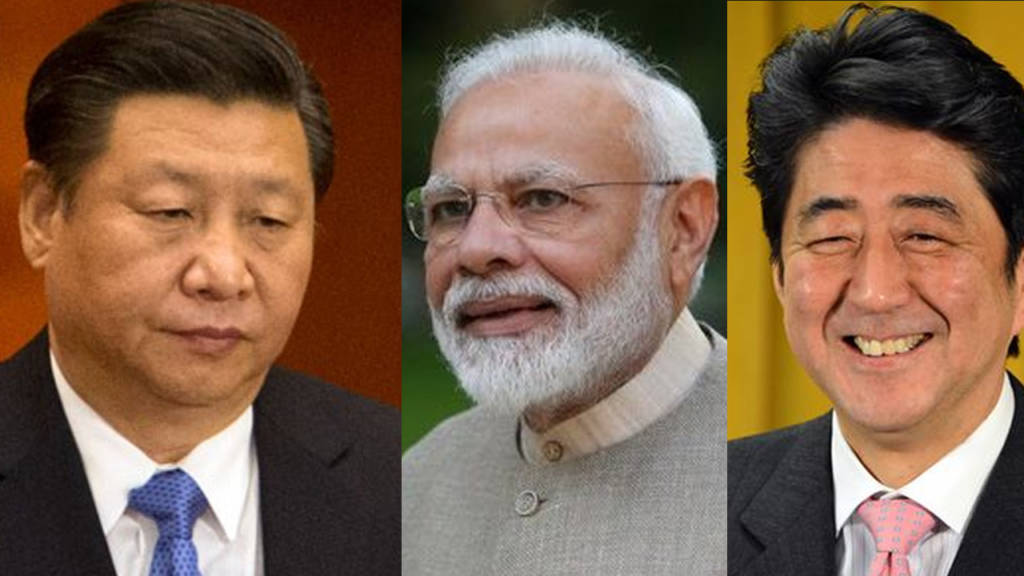The northeastern city of Guwahati in Assam will be the centre of attention in December during a two day India-Japan Summit to be held in the city. PM Modi and Japanese PM Shinzo Abe will attend the Summit, the dates of which are yet to be finalised. The highlights of the Annual Summit will be a visit to the new Peace Museum, a remembrance memorial of one of the fiercest battles of World War II in the year 1944 in which many Japanese soldiers had lost their lives, located in Manipur’s capital, Imphal and also a cruise in the mighty Brahmaputra river.
Guwahati has been chosen as the venue for the Annual Summit with the view of focussing on India’s North-East region under the Act East Forum launched by both the countries. The Act East Forum, propagated jointly by India and Japan is an attempt to augment bilateral trade between Tokyo and northeast India that would further strengthen India-Japan relations. The essence of the Forum is to stress upon New Delhi’s Act East policy and Tokyo’s Free and Open Indo-Pacific Strategy.
Northeast India has already become the centre of closer ties between India and Japan. Tokyo is helping India in several developmental projects across the North-East including a water supply-sewage project in Assam, a Meghalaya road project, forest management programmes in Tripura, Nagaland and Sikkim and an irrigation project in Mizoram. In fact, North-eastern has become the hotspot of Japanese investments. Japan is reportedly willing to invest Rs. 13,000 crore in the region.
The Annual Summit between India and Japan which will be attended by PM Modi and his Japanese counterpart will not only come as a major boost when it comes to further strengthening Indo-Japan ties, but it also brings a sense of positivity for Northeast India. It will not only boost Japanese investments in the region but will also open up the region for greater tourism potential.
PM Modi’s historic visits to cities like Mamallapuram, venue of Indo-China informal Summit held earlier this year and Ahmedabad which hosted the Japanese PM Shinzo Abe and his wife in the year 2017, have been able to cause a much-needed spike in tourism to those cities. In such circumstances, tourism can be expected to witness a major spike in the largely unexplored North-eastern India that offers tremendous potential when it comes to tourism. This potential has largely remained untapped in lack of any serious efforts to promote tourism in the region. However, with PM Modi bringing the region into domestic and global limelight, we can expect a massive inflow of domestic and foreign tourists that will bolster the economic progress of northeastern India.
The benefits attached with the hosting of the Annual Summit in Guwahati are not limited to just economic benefits for the region. It is also a matter of soft signalling. By inviting the Japanese Prime Minister to Guwahati, the biggest city in Northeast India, India has given a clear signal to Beijing. By inviting Japan, the Dragon’s foe to the Northeast, India has made it clear that the Northeastern region is an integral part of India.
China has been continuously trying to meddle in India’s North-eastern region by pushing and promoting separatist sentiment. As per recent reports, some top commanders of the separatist group National Socialist Council of Nagalim (Isak-Muivah) faction are said to be camping in China. They are also believed to be trying to convince the Chinese leadership to help them fight for its cause against the Government of India. Phungting Shimrang, the former chief and senior member of NSCN-IM, is said to have gone to the Yuhan province of China with two trusted commanders. This is an example of how Beijing has been trying to interfere in India’s internal affairs. It has been trying to create unrest in the region by pushing the separatist sentiment in the North-eastern India.
The Japanese Prime Minister coming to Guwahati and visiting other northeastern states along with PM Modi is going to make the Dragon very uncomfortable and very insecure. Last year, China had opposed foreign investments in what it described as the “disputed areas” of India’s North East. However, India has dropped a strong hint making it clear that Beijing should have no business to make decisions about India’s Northeastern region. India has therefore invited a major investor in the form of Japan to the North-East which is further to augment the investments of China’s foe in the region much to Beijing’s dismay. In this background, Guwahati will be the epicentre of Indian and global attention when the Prime Ministers of India and Japan will visit the city during their Annual Summit next month.
